Boosting Seniors' Immunity: Essential Tips for Healthy Aging
Therefore, it is crucial for seniors to prioritize strategies that bolster their immunity and enhance their ability to fight off diseases. In this blog post, we will explore the importance of immunity for seniors' health and provide practical tips and strategies to strengthen the immune system and promote optimal health and vitality in later life.
The immune system is a complex network of cells, tissues, and organs that work together to defend the body against harmful pathogens such as bacteria, viruses, and other foreign invaders. Its primary function is to identify and destroy these pathogens to prevent infection and illness.
In a healthy immune system, specialized cells called white blood cells, including lymphocytes (T cells and B cells) and phagocytes, play crucial roles in recognizing and attacking foreign substances. T cells target infected cells and coordinate immune responses, while B cells produce antibodies that bind to and neutralize specific pathogens. Phagocytes engulf and digest foreign particles, helping to eliminate them from the body.
Understanding Immunity in Seniors
The immune system is a complex network of cells, tissues, and organs that work together to defend the body against harmful pathogens such as bacteria, viruses, and other foreign invaders. Its primary function is to identify and destroy these pathogens to prevent infection and illness.
In a healthy immune system, specialized cells called white blood cells, including lymphocytes (T cells and B cells) and phagocytes, play crucial roles in recognizing and attacking foreign substances. T cells target infected cells and coordinate immune responses, while B cells produce antibodies that bind to and neutralize specific pathogens. Phagocytes engulf and digest foreign particles, helping to eliminate them from the body.
As we age, the immune system undergoes changes that can impact its effectiveness in fighting off infections and diseases. One significant change is immunosenescence, the gradual decline in immune function associated with aging. This decline affects both the innate and adaptive immune responses, leading to decreased immune surveillance, impaired immune cell function, and a reduced ability to mount robust immune responses to new infections.
Additionally, aging is often accompanied by thymic involution, a process in which the thymus gland, a key organ for T cell maturation, decreases in size and function. This results in fewer naïve T cells available to respond to new pathogens, further compromising immune function.
The decline in immune function with aging can have several effects on seniors' health. Older adults may experience increased susceptibility to infections, longer recovery times from illnesses, and a higher risk of developing chronic inflammatory conditions. Moreover, the weakened immune system may contribute to the decreased effectiveness of vaccines in older individuals, making them more susceptible to vaccine-preventable diseases.
Understanding these changes in immunity is essential for seniors and their caregivers to take proactive steps to support immune health and minimize the risk of infections and illnesses. In the following sections, we will explore strategies to strengthen the immune system and promote overall health and well-being in seniors.
Several factors contribute to the age-related changes in immune function observed in seniors. These factors can influence the effectiveness of the immune response and impact overall immune health. Understanding these factors is crucial for identifying strategies to support seniors' immune systems. Let's explore some of the key factors:
Immunosenescence: Immunosenescence refers to the natural aging process that leads to a decline in immune function. Studies have shown that aging is associated with alterations in immune cell populations, decreased production of immune signaling molecules, and impaired immune cell function (Nikolich-Žugich, 2018). These changes can compromise the body's ability to mount effective immune responses to infections and vaccinations.
Thymic Involution: The thymus gland, which plays a critical role in the maturation of T cells, undergoes involution or shrinkage with age. This process reduces the production of naïve T cells, which are essential for initiating immune responses against new pathogens (Goronzy & Weyand, 2019). Thymic involution contributes to the decline in T cell-mediated immunity observed in seniors.
Chronic Inflammation: Aging is often associated with low-grade, chronic inflammation, a condition known as inflammaging. Chronic inflammation can dysregulate the immune system and contribute to the development of age-related diseases such as cardiovascular disease, diabetes, and neurodegenerative disorders (Franceschi et al., 2018). Inflammaging can also impair immune cell function and increase susceptibility to infections.
Nutritional Status: Adequate nutrition is essential for maintaining optimal immune function. Malnutrition, micronutrient deficiencies, and inadequate intake of protein, vitamins, and minerals can compromise immune health and increase susceptibility to infections (Calder et al., 2019). Poor nutritional status is common among seniors and can contribute to immune dysfunction.
Comorbidities and Medications: Seniors often have multiple chronic health conditions and may take several medications to manage these conditions. Certain comorbidities, such as diabetes, kidney disease, and cancer, can impair immune function and increase the risk of infections (Chou et al., 2018). Additionally, some medications, such as corticosteroids and immunosuppressants, can suppress the immune system and increase susceptibility to infections.
Lifestyle Factors: Lifestyle factors such as smoking, excessive alcohol consumption, sedentary behavior, and poor sleep quality can negatively impact immune function (Nieman & Wentz, 2019). Smoking, for example, is known to impair immune cell function and increase the risk of respiratory infections in seniors (Arcavi & Benowitz, 2004).
Additionally, aging is often accompanied by thymic involution, a process in which the thymus gland, a key organ for T cell maturation, decreases in size and function. This results in fewer naïve T cells available to respond to new pathogens, further compromising immune function.
The decline in immune function with aging can have several effects on seniors' health. Older adults may experience increased susceptibility to infections, longer recovery times from illnesses, and a higher risk of developing chronic inflammatory conditions. Moreover, the weakened immune system may contribute to the decreased effectiveness of vaccines in older individuals, making them more susceptible to vaccine-preventable diseases.
Understanding these changes in immunity is essential for seniors and their caregivers to take proactive steps to support immune health and minimize the risk of infections and illnesses. In the following sections, we will explore strategies to strengthen the immune system and promote overall health and well-being in seniors.
Factors Affecting Seniors' Immunity
Several factors contribute to the age-related changes in immune function observed in seniors. These factors can influence the effectiveness of the immune response and impact overall immune health. Understanding these factors is crucial for identifying strategies to support seniors' immune systems. Let's explore some of the key factors:
Immunosenescence: Immunosenescence refers to the natural aging process that leads to a decline in immune function. Studies have shown that aging is associated with alterations in immune cell populations, decreased production of immune signaling molecules, and impaired immune cell function (Nikolich-Žugich, 2018). These changes can compromise the body's ability to mount effective immune responses to infections and vaccinations.
Thymic Involution: The thymus gland, which plays a critical role in the maturation of T cells, undergoes involution or shrinkage with age. This process reduces the production of naïve T cells, which are essential for initiating immune responses against new pathogens (Goronzy & Weyand, 2019). Thymic involution contributes to the decline in T cell-mediated immunity observed in seniors.
Chronic Inflammation: Aging is often associated with low-grade, chronic inflammation, a condition known as inflammaging. Chronic inflammation can dysregulate the immune system and contribute to the development of age-related diseases such as cardiovascular disease, diabetes, and neurodegenerative disorders (Franceschi et al., 2018). Inflammaging can also impair immune cell function and increase susceptibility to infections.
Nutritional Status: Adequate nutrition is essential for maintaining optimal immune function. Malnutrition, micronutrient deficiencies, and inadequate intake of protein, vitamins, and minerals can compromise immune health and increase susceptibility to infections (Calder et al., 2019). Poor nutritional status is common among seniors and can contribute to immune dysfunction.
Comorbidities and Medications: Seniors often have multiple chronic health conditions and may take several medications to manage these conditions. Certain comorbidities, such as diabetes, kidney disease, and cancer, can impair immune function and increase the risk of infections (Chou et al., 2018). Additionally, some medications, such as corticosteroids and immunosuppressants, can suppress the immune system and increase susceptibility to infections.
Lifestyle Factors: Lifestyle factors such as smoking, excessive alcohol consumption, sedentary behavior, and poor sleep quality can negatively impact immune function (Nieman & Wentz, 2019). Smoking, for example, is known to impair immune cell function and increase the risk of respiratory infections in seniors (Arcavi & Benowitz, 2004).
By addressing these factors and implementing strategies to support immune health, seniors can enhance their resilience to infections and improve overall well-being.
Eat a Balanced Diet: Encourage seniors to consume a variety of nutrient-rich foods, including fruits, vegetables, whole grains, lean proteins, and healthy fats. Examples of food rich in vitamins and minerals that support immune health are:
Stay Hydrated: Proper hydration is essential for maintaining overall health and supporting immune function. Encourage seniors to drink an adequate amount of water throughout the day, as dehydration can weaken the immune system. Proper hydration helps maintain the balance of bodily fluids, which is essential for the optimal functioning of the immune system. Water supports the production and circulation of lymph, a fluid that carries white blood cells and other immune cells throughout the body, helping to defend against infections.
In addition to water, seniors can also hydrate with other fluids such as herbal teas, broths, and diluted fruit juices. It's essential to monitor hydration levels, especially in older adults who may be at a higher risk of dehydration due to factors like reduced thirst sensation, medication side effects, or mobility issues. Encouraging regular fluid intake and offering fluids with meals and snacks can help seniors stay adequately hydrated and support their immune health.

Maintain a Healthy Weight: Excess weight can strain the immune system and increase the risk of chronic conditions. Encourage seniors to maintain a healthy weight through a balanced diet and regular physical activity, as obesity can impair immune function. Obesity is associated with chronic low-grade inflammation, which can disrupt immune function. Excess adipose tissue secretes pro-inflammatory cytokines, such as tumor necrosis factor-alpha (TNF-alpha) and interleukin-6 (IL-6), which can impair the body's ability to mount an effective immune response to infections. Obese individuals may be more susceptible to infections, including respiratory infections like influenza and pneumonia. Studies have shown that obesity is linked to a higher risk of hospitalization and complications from infectious diseases.
Tips for Strengthening Seniors' Immunity
Eat a Balanced Diet: Encourage seniors to consume a variety of nutrient-rich foods, including fruits, vegetables, whole grains, lean proteins, and healthy fats. Examples of food rich in vitamins and minerals that support immune health are:
- Vitamin C: Citrus fruits (oranges, lemons, grapefruits), strawberries, kiwi, bell peppers, broccoli, Brussels sprouts, tomatoes, and spinach.
- Vitamin D: Fatty fish (salmon, tuna, mackerel), fortified dairy products (milk, yogurt, cheese), fortified orange juice, egg yolks, and mushrooms.
- Zinc: Lean meats (beef, pork, poultry), shellfish (oysters, crab, lobster), legumes (beans, lentils, chickpeas), nuts and seeds (pumpkin seeds, cashews), and whole grains (wheat germ, quinoa).
- Antioxidants: Berries (blueberries, raspberries, strawberries), dark leafy greens (kale, spinach, Swiss chard), nuts and seeds (almonds, walnuts, flaxseeds), dark chocolate, green tea, and colorful vegetables (carrots, sweet potatoes, beets).
In addition to water, seniors can also hydrate with other fluids such as herbal teas, broths, and diluted fruit juices. It's essential to monitor hydration levels, especially in older adults who may be at a higher risk of dehydration due to factors like reduced thirst sensation, medication side effects, or mobility issues. Encouraging regular fluid intake and offering fluids with meals and snacks can help seniors stay adequately hydrated and support their immune health.

Maintain a Healthy Weight: Excess weight can strain the immune system and increase the risk of chronic conditions. Encourage seniors to maintain a healthy weight through a balanced diet and regular physical activity, as obesity can impair immune function. Obesity is associated with chronic low-grade inflammation, which can disrupt immune function. Excess adipose tissue secretes pro-inflammatory cytokines, such as tumor necrosis factor-alpha (TNF-alpha) and interleukin-6 (IL-6), which can impair the body's ability to mount an effective immune response to infections. Obese individuals may be more susceptible to infections, including respiratory infections like influenza and pneumonia. Studies have shown that obesity is linked to a higher risk of hospitalization and complications from infectious diseases.
Engage in Regular Exercise: Physical activity can help boost immunity by promoting circulation, reducing inflammation, and supporting overall health. Encourage seniors to engage in regular exercise, such as walking, swimming, yoga, or tai chi, according to their abilities and preferences. Exercise has anti-inflammatory effects, helping to reduce levels of pro-inflammatory cytokines and other markers of inflammation in the body. Aerobic exercise, in particular, can improve respiratory function and lung capacity, which may help reduce the risk of respiratory infections such as colds, flu, and pneumonia.
Get Sufficient Sleep: Quality sleep is crucial for immune function and overall well-being. Encourage seniors to prioritize sleep hygiene by establishing a regular sleep schedule, creating a comfortable sleep environment, and practicing relaxation techniques before bedtime.
Manage Stress: Chronic stress can weaken the immune system and increase susceptibility to illness. Encourage seniors to practice stress-reduction techniques such as deep breathing, meditation, mindfulness, or engaging in enjoyable activities to promote relaxation and resilience.
Practice Good Hygiene: Reinforce the importance of good hygiene practices, such as frequent handwashing, especially during cold and flu seasons. Encourage seniors to avoid close contact with individuals who are sick and to cover their mouth and nose when coughing or sneezing.
Stay Up-to-Date with Vaccinations: Vaccinations can help prevent certain infectious diseases and reduce the severity of illness. Ensure that seniors receive recommended vaccinations, including annual flu shots and other vaccines recommended by healthcare professionals based on their age and health status.
Limit Alcohol and Tobacco Use: Excessive alcohol consumption and smoking can weaken the immune system and increase the risk of infections and chronic diseases. Chronic alcohol consumption has been shown to impair the function of various immune cells, including neutrophils, macrophages, dendritic cells, and lymphocytes. These immune cells play critical roles in defending the body against pathogens, and their dysfunction can compromise the body's ability to mount an effective immune response. Alcohol has also been found to suppress the production of antibodies, which are essential for recognizing and neutralizing pathogens. Studies have shown that chronic alcoholics may have lower levels of antibodies in their bloodstream, leading to decreased immunity against infections.
Stay Connected: Social isolation and loneliness can negatively impact immune function. Encourage seniors to stay connected with friends, family, and community members through social activities, hobbies, and technology to promote emotional well-being and immune health.
In conclusion, maintaining a robust immune system is crucial for seniors to lead healthy, active lives. As we age, our immune defenses may weaken, making us more susceptible to infections and chronic illnesses. However, by incorporating simple yet effective strategies into daily life, such as consuming a nutritious diet, staying hydrated, exercising regularly, and minimizing stress, seniors can significantly enhance their immune function and overall well-being.
Remember, small lifestyle changes can make a big difference in supporting immune health. By prioritizing self-care and adopting healthy habits, seniors can fortify their bodies against illness and enjoy greater vitality and resilience in their golden years. Let's empower seniors to take charge of their health and embrace a life of wellness and longevity!"
References:
Arcavi, L., & Benowitz, N. L. (2004). Cigarette smoking and infection. Archives of Internal Medicine, 164(20), 2206–2216.
Calder, P. C., Carr, A. C., Gombart, A. F., & Eggersdorfer, M. (2019). Optimal nutritional status for a well-functioning immune system is an important factor to protect against viral infections. Nutrients, 12(4), 1181.
Chou, M. Y., Chu, C. H., Lin, Y. C., Shih, Y. N., Lin, H. C., Kuo, T. Y., ... & Yang, Y. H. (2018). High prevalence of comorbidity and association with female gender, higher disease activity, and lower functional status in Taiwanese patients with rheumatoid arthritis. Journal of the Chinese Medical Association, 81(4), 362-368.
Franceschi, C., Garagnani, P., Parini, P., Giuliani, C., & Santoro, A. (2018). Inflammaging: a new immune–metabolic viewpoint for age-related diseases. Nature Reviews Endocrinology, 14(10), 576-590.
Goronzy, J. J., & Weyand, C. M. (2019). Mechanisms underlying T cell ageing. Nature Reviews Immunology, 19(9), 573–583.
Nikolich-Žugich, J. (2018). The twilight of immunity: emerging concepts in aging of the immune system. Nature Immunology, 19(1), 10–19.
Nieman, D. C., & Wentz, L. M. (2019). The compelling link between physical activity and the body's defense system. Journal of Sport and Health Science, 8(3), 201–217.
References:
Arcavi, L., & Benowitz, N. L. (2004). Cigarette smoking and infection. Archives of Internal Medicine, 164(20), 2206–2216.
Calder, P. C., Carr, A. C., Gombart, A. F., & Eggersdorfer, M. (2019). Optimal nutritional status for a well-functioning immune system is an important factor to protect against viral infections. Nutrients, 12(4), 1181.
Chou, M. Y., Chu, C. H., Lin, Y. C., Shih, Y. N., Lin, H. C., Kuo, T. Y., ... & Yang, Y. H. (2018). High prevalence of comorbidity and association with female gender, higher disease activity, and lower functional status in Taiwanese patients with rheumatoid arthritis. Journal of the Chinese Medical Association, 81(4), 362-368.
Franceschi, C., Garagnani, P., Parini, P., Giuliani, C., & Santoro, A. (2018). Inflammaging: a new immune–metabolic viewpoint for age-related diseases. Nature Reviews Endocrinology, 14(10), 576-590.
Goronzy, J. J., & Weyand, C. M. (2019). Mechanisms underlying T cell ageing. Nature Reviews Immunology, 19(9), 573–583.
Nikolich-Žugich, J. (2018). The twilight of immunity: emerging concepts in aging of the immune system. Nature Immunology, 19(1), 10–19.
Nieman, D. C., & Wentz, L. M. (2019). The compelling link between physical activity and the body's defense system. Journal of Sport and Health Science, 8(3), 201–217.

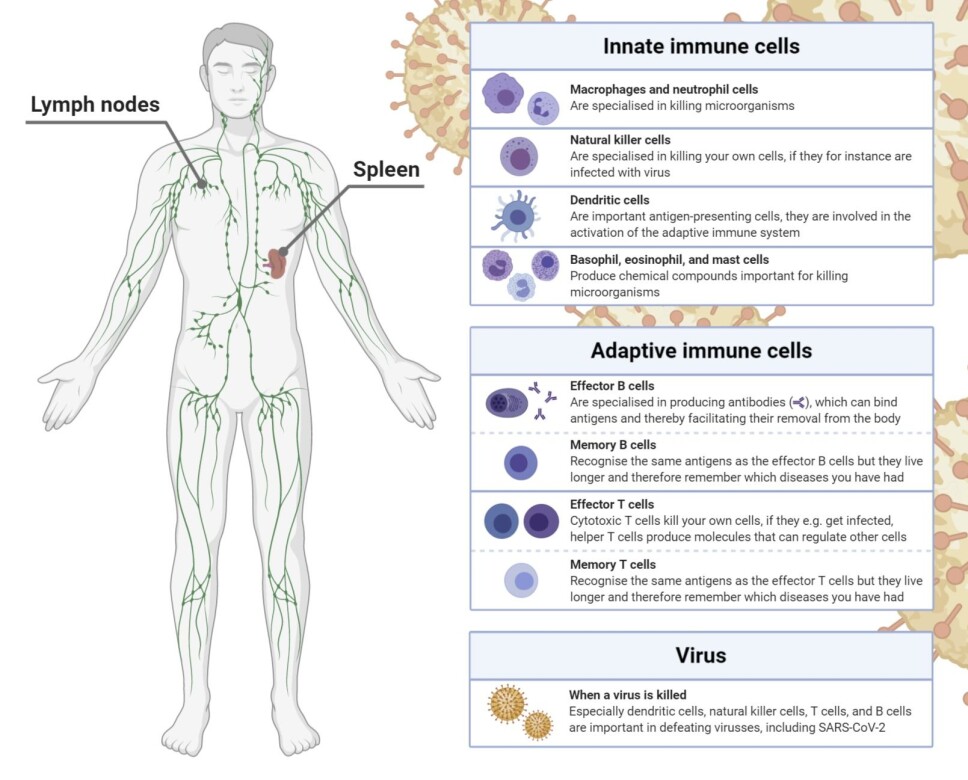
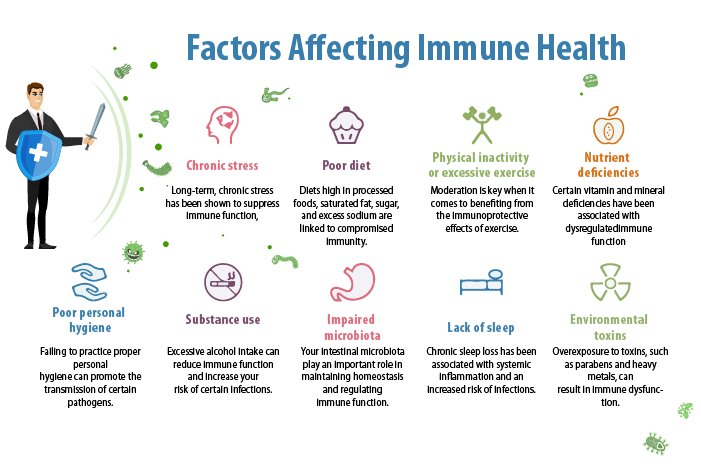


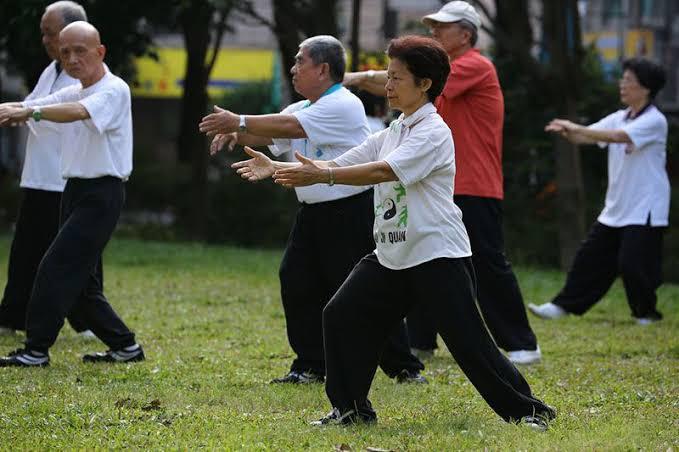


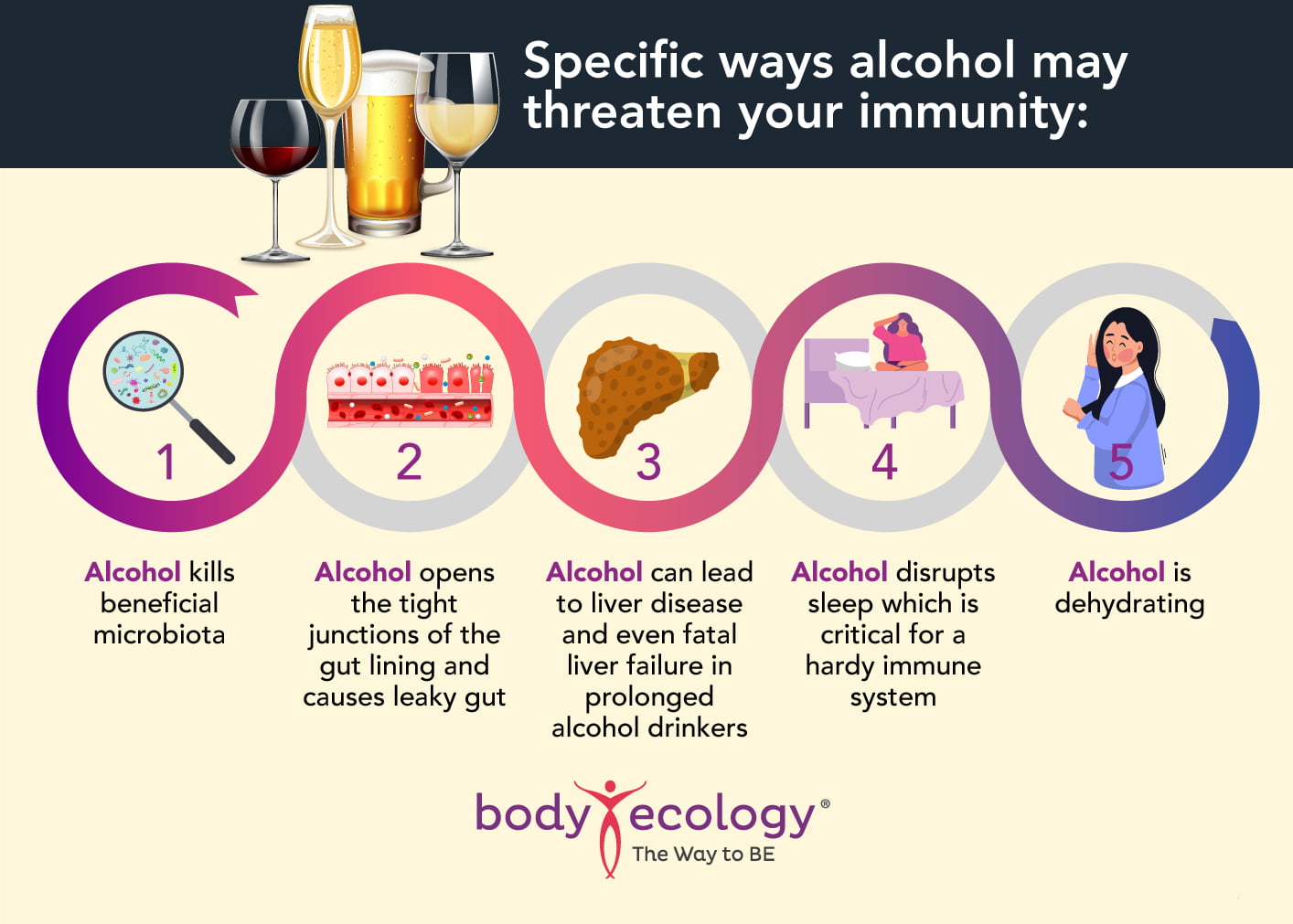

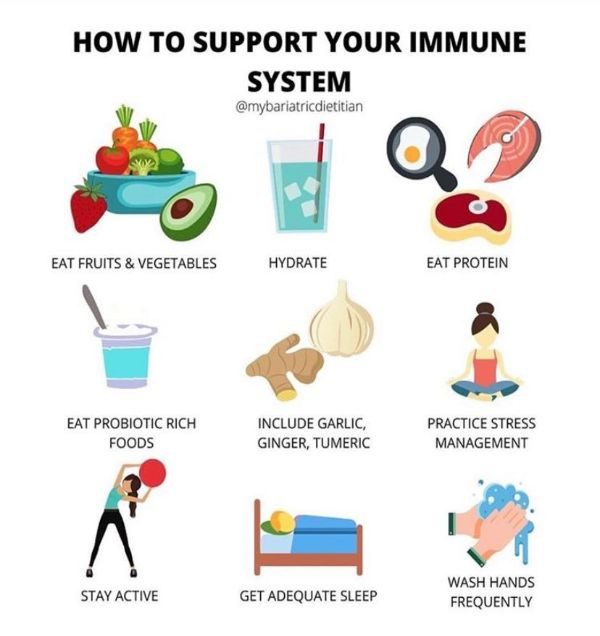

Comments
Post a Comment